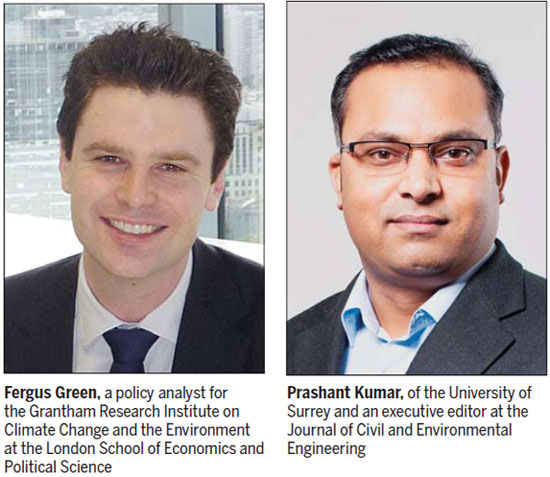Blue skies over Beijing ... for now
Updated: 2015-09-05 07:44
By Wang Mingjie(China Daily Europe)
|
|||||||||||

Green estimates that if the existing economic and policy trends continue, China's greenhouse gas emissions are likely to peak by 2025, perhaps even earlier.
"Many sectors in China's economy are experiencing serious problems with overcapacity, particularly in construction, heavy industries such as steel, cement and aluminum, and coal-fired power generation," he says.
"Further investment in these sectors would be inefficient and hinder economic growth over the medium term.
"The key to future sustainable growth in China is a shift toward increasing domestic household consumption, especially of services, and a reallocation of capital investment toward services and innovative, higher value-added manufacturing industries such as renewable energy and energy-efficient technologies."
To reduce demand for private vehicles, he suggests the government considers "compact city" planning measures based on high-density areas linked by efficient and affordable public transport, and pedestrian and cycling infrastructure, such as bike-sharing projects and bike lanes.
Green also proposes imposing a congestion charge, a means of taxing private vehicle use during peak times, as is done in London and Singapore.
At the national level, he says, long-term policy support for innovation in low-carbon, low-pollution energy and transport technologies should be encouraged.
Air pollution is an issue in many Asian cities, and Beijing is not the only megacity that finds it difficult to keep the skies blue.
Prashant Kumar, of the University of Surrey and an executive editor at the Journal of Civil and Environmental Engineering, cites New Delhi, where vehicles are also a major source of pollution despite public transport running on relatively clean compressed natural gas.
Controlling emissions at the source will reduce them, but simply placing a blanket ban on cars is not sustainable for a city, he says, so instead better fuel quality and vehicle technology should be used.
"A key aspect is to use cleaner diesel - for example, in Europe they use ultra-sulfur diesel. Lowering the quantity of sulfur in diesel helps to cut emissions of sulfur dioxide, which is a precursor gas for tiny nanoparticles," Kumar says.
During a visit to France in June, Premier Li Keqiang announced plans to cut China's carbon emissions per unit of gross domestic product by 60 to 65 percent compared with 2005 levels. The move was part of a plan submitted to the United Nations before the Paris climate change talks in December.
"China's contribution to the international climate conference in Paris is very constructive and indicates the importance with which the Chinese leadership views this conference and the issue of climate change," Green says. "The European Union and its member states can and should work closely with China to address the shared challenges of climate change, resource and energy security, and environmental pollution and degradation."
In particular, he says, the two sides should collaborate in the areas of clean technology innovation such as offshore wind farms, advanced solar technologies, battery storage, smart electricity grid infrastructure, and green financial institutions and mechanisms.
Green also urges both parties to look into "developing fiscal policies and measures to discourage high-carbon and environmentally destructive energy sources and technologies, including phasing out direct subsidies for fossil fuels and electricity; introducing resource taxes on coal and other fossil fuel resources; introducing local taxes and charges on congestion, landfill and other polluting activities; and encouraging low- or zero-carbon energy sources and technologies".
wangmingjie@mail.chinadailyuk.com
Today's Top News
Acquiring knowledge, building strength
Foreign bears don't affect China - yet
Austria to end messures letting migrants in
Ex-VP nominee Palin: Immigrants in US should 'speak American'
China 2014 GDP growth revised down to 7.3%
White paper on Tibet reaffirms living Buddha policy
Austria, Germany open borders to migrants
PBOC governor says stock market correction roughly in place
Hot Topics
Lunar probe , China growth forecasts, Emission rules get tougher, China seen through 'colored lens', International board,
Editor's Picks

|

|

|

|

|

|






